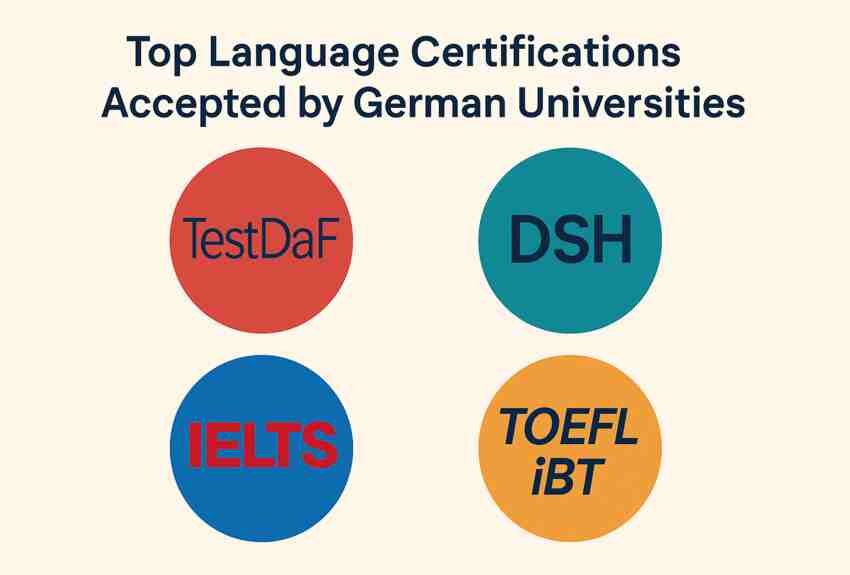
Germany is a global hub for higher education, attracting thousands of international students each year. With its renowned universities, affordable tuition, and high-quality education, it’s no surprise why students aspire to study here. However, one major requirement to enroll in a German university is proving language proficiency. Whether your course is in English or German, universities need to ensure you have the linguistic skills to succeed academically.
This blog will walk you through the top language certifications accepted by German universities, easing the stress of language requirements for international students.
Why Do German Universities Require Language Proficiency?
Language proficiency is essential for navigating both academics and daily life in Germany. Programs taught in German demand fluency to comprehend lectures and participate in class. Similarly, English-taught courses require proficiency to ensure smooth communication and learning.
If you’re worried about meeting these requirements, don’t stress—there are several language certifications you can choose from, depending on your desired course language.
Top Certifications for German Proficiency
1. TestDaF (Test Deutsch als Fremdsprache)
TestDaF is one of the most widely accepted certifications for studying in Germany. It evaluates your reading, listening, writing, and speaking skills. The exam is designed for non-native speakers aiming to study or work in Germany.
- Accepted by: Most German universities.
- Proficiency Levels: B2 to C1 (according to the CEFR).
- Test Format: Four sections (reading, listening, writing, speaking).
- Cost: €195–€215.
2. DSH (Deutsche Sprachprüfung für den Hochschulzugang)
DSH is specifically for students applying to German universities. This exam is conducted by individual universities and measures your ability to understand academic German.
- Accepted by: Almost all universities in Germany.
- Proficiency Levels: B2 to C1.
- Test Format: Includes reading, listening, writing, and oral exams.
- Cost: €100–€200, depending on the institution.
3. Goethe-Zertifikat
The Goethe-Zertifikat is an internationally recognized German language certification offered by the Goethe-Institut. Universities usually accept certifications from B2 or higher.
- Accepted by: Many German universities.
- Proficiency Levels: A1 to C2.
- Test Format: Tailored for different levels, covering reading, writing, listening, and speaking.
- Cost: €150–€350, depending on the level.
4. Telc Deutsch
The Telc Deutsch exam is another popular choice, especially for those pursuing higher education in Germany. It’s available at multiple levels, but universities typically require B2 or C1.
- Accepted by: Various universities and institutions.
- Proficiency Levels: A1 to C2.
- Test Format: Reading, writing, listening, and speaking.
- Cost: €100–€200.
5. ÖSD (Österreichisches Sprachdiplom Deutsch)
Though an Austrian certification, the ÖSD is recognized in Germany as well. It assesses your ability to use German in academic and professional contexts.
- Accepted by: Some German universities.
- Proficiency Levels: A1 to C2.
- Test Format: Includes speaking, reading, listening, and writing.
- Cost: €90–€170.
Top Certifications for English Proficiency
If your course is taught in English, you’ll need an English language certification. Here are the most commonly accepted ones:
1. IELTS (International English Language Testing System)
The IELTS is widely accepted by German universities for English-taught programs. It evaluates your overall English skills.
- Accepted by: Most universities.
- Proficiency Levels: Band scores between 6.0–7.5 (depending on the university).
- Test Format: Reading, writing, listening, and speaking.
- Cost: €240–€270.
2. TOEFL (Test of English as a Foreign Language)
TOEFL is another globally recognized test for English proficiency. Many German universities accept it for admission into English-taught programs.
- Accepted by: Numerous universities.
- Proficiency Levels: 80–100 on the iBT scale.
- Test Format: Reading, listening, speaking, and writing.
- Cost: €240.
3. Cambridge English Qualifications
The Cambridge English exams are often used to prove English proficiency for academic purposes. Certifications like the C1 Advanced (CAE) and C2 Proficiency (CPE) are highly regarded.
- Accepted by: Some German universities.
- Proficiency Levels: C1 and C2.
- Test Format: Reading, writing, use of English, listening, and speaking.
- Cost: €200–€300.
Comparison Table: Language Certifications at a Glance
| Certification | Language | Proficiency Levels | Cost Range | Accepted By |
| TestDaF | German | B2–C1 | €195–€215 | Most German universities |
| DSH | German | B2–C1 | €100–€200 | Almost all universities |
| Goethe-Zertifikat | German | A1–C2 | €150–€350 | Many German universities |
| Telc Deutsch | German | A1–C2 | €100–€200 | Various universities |
| IELTS | English | Band 6.0–7.5 | €240–€270 | Most universities |
| TOEFL | English | 80–100 (iBT) | €240 | Numerous universities |
| Cambridge C1/C2 | English | C1–C2 | €200–€300 | Some universities |
Tips to Choose the Right Certification
- Check University Requirements: Before registering for any test, verify which certifications your university accepts.
- Assess Your Proficiency: Choose a test that aligns with your current language skills and academic goals.
- Prepare in Advance: Language tests often require months of preparation. Use online resources or enroll in prep courses.
Conclusion
Navigating the language certification process can feel overwhelming, but understanding your options makes it easier. Germany’s universities provide a range of choices to cater to students from all backgrounds, whether your program is in German or English.
Choose a certification that fits your needs, start preparing early, and take one step closer to your dream of studying in Germany. With dedication and planning, you’ll not only meet the language requirements but also excel in your academic journey abroad.
